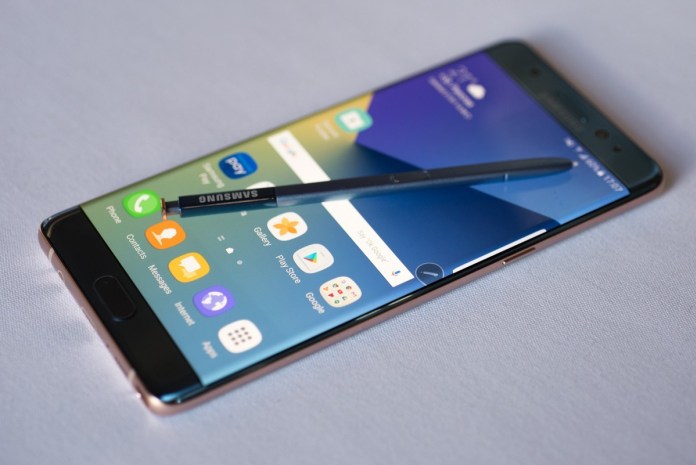Few weeks after Samsung launched its latest mobile phone, the Samsung Galaxy Note 7, the company has advised consumers in some markets, (not Nigeria) to stop using the mobile phone, and to immediately participate in a replacement programme, following further reports of the phones catching fire.
Meanwhile, the company has lost $22billion in market capitalisation as its share price has ranked 11 per cent since Friday last week, the largest two-day decline in eight years, according to Bloomberg.
The call came after the US Consumer Product Safety Commission recommended on Friday that consumers stop using the smartphone and major airlines globally banned use during flights.
Samsung issued a recall for Galaxy Note 7 smartphone in early September in 10 markets, including the US and South Korea, but not in Nigeria, following reported cases that the battery of Galaxy Note 7 phone burst into flames after fully charged.
Defective batteries, which caught fire during charging and normal use, were apparently manufactured by Samsung SDI. Batteries made by its other supplier, Amperex Technology, have not faced the same issues.
Samsung said it is now only using batteries made by Amperex for the Galaxy Note 7 and has ordered an additional four million as replacements, Yonhap reported. The Chinese firm, which also supplies batteries for Apple’s iPhones, is now the sole battery suppler for the Note 7.
Samsung’s battery unit previously supplied about 70 per cent of the batteries for Note 7. The world’s largest smartphone maker reportedly was looking for a third battery supplier but hasn’t found one. As demand for the iPhone 7 models takes off, Samsung could face a supply crunch.
With an estimated 2.5 million Galaxy Note 7 units sold, analysts say the recall could cost Samsung as much as $5 billion in revenue. The smartphone was launched on August, 2, 2016.
The company has lost $22 billion in market capitalisation as its share price has tanked 11 per cent since Friday – the largest two-day decline in eight years, according to Bloomberg.
Samsung issued a statement for the Hong Kong and Macau markets, outlining that “we wish to re-emphasise that Galaxy Note 7s purchased in Hong Kong and Macau from authorised resellers on or after September 2, are not affected by the issue as those batteries are provided by a different supplier”.
It previously said that fewer than 500 Galaxy Note 7s sold in Hong Kong and Macau between 26 August and 1 September “may be affected by the battery issue”. It said a replacement programme is running and it “has been proactively contacting customers who may be affected.
The Galaxy Note 7 is a beautiful, capable Android phone that showcases Samsung’s best in design, speed and features, but not in battery life.
The 64GB base model leaves users with plenty of space for photos, videos and games, and it’s a real improvement over 2015’s Note 5.
The 5.7-inch, stylus-slinging Samsung Galaxy Note 7 is a damn fine phone. Its sexy wraparound glass, precise S Pen and brilliant screen would impress anyone, but it’s ideal for artists, architects and people who would rather write with their own hand than type on a screen.


 Billionaire Watch3 weeks ago
Billionaire Watch3 weeks ago
 Startups4 weeks ago
Startups4 weeks ago
 News4 weeks ago
News4 weeks ago
 News4 weeks ago
News4 weeks ago
 Bitcoin4 weeks ago
Bitcoin4 weeks ago
 Naira4 weeks ago
Naira4 weeks ago
 Forex3 weeks ago
Forex3 weeks ago
 Treasury Bills4 weeks ago
Treasury Bills4 weeks ago
























